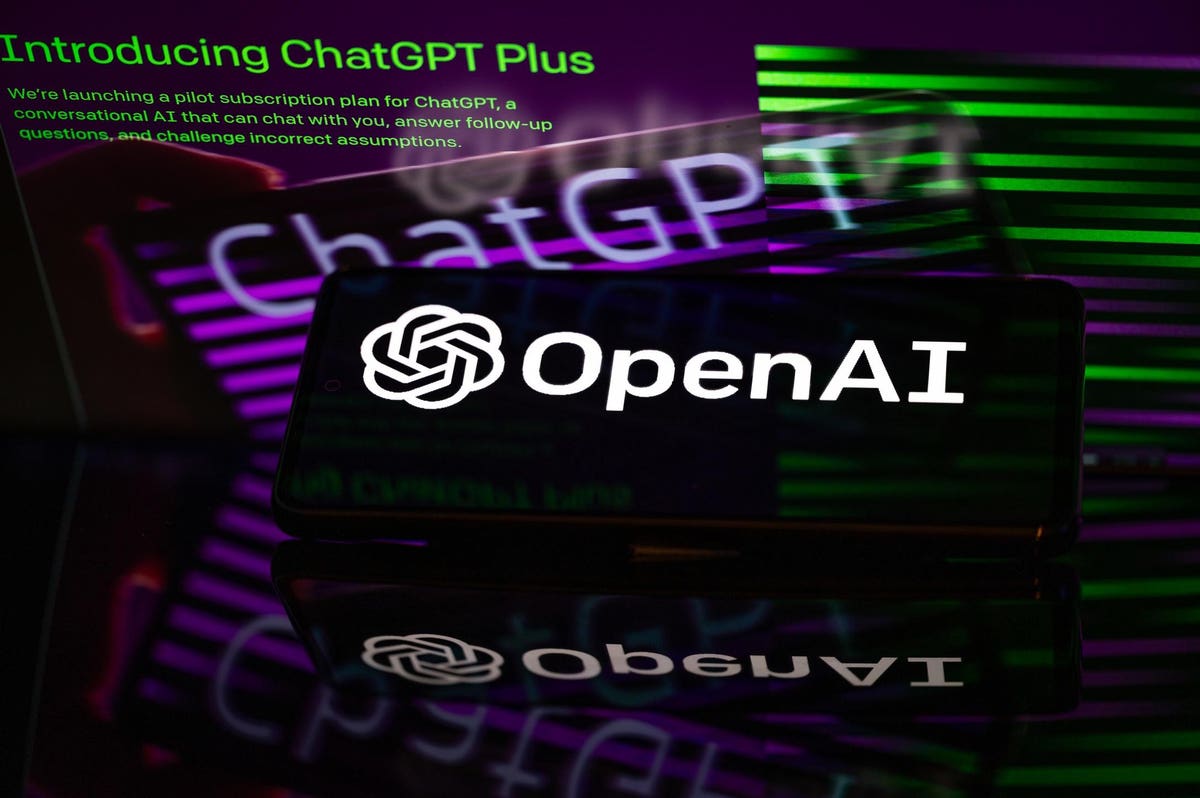Is Generative AI — chatbots that spit out original content in response to natural language user prompts — over-hyped?
Consulting firms — competing to help their clients tap the technology’s potential to improve their business — are putting their money where their mouths are.
Here are three examples:
- Accenture
ACN
- KPMG pledged to buy $2 billion worth of Microsoft
MSFT
- PwC is investing $1 billion in a “3-year AI roadmap” and plans to strengthen AI customer offerings, strengthen tech partnerships, and train 65,000 employees.
Meanwhile — while not quantifying their investments — Mckinsey, Boston Consulting Group, and Deloitte and others have published their thoughts on how potential clients — with the consultants help — can benefit from deploying Generative AI.
It could take years to find out whether these investments pay off. Yet consulting executives I interviewed this month say they are seeing strong client demand for their services.
One industry expert, Michele Goetz, Forrester Research
FORR
The reason? Through lower costs and/or higher revenues, clients expect Generative AI applications to earn back those consulting fees within three months of deployment.
Read on for details on how much companies are benefiting from Generative AI consulting services, what distinguishes the most successful consultants from their peers, and which new services consultants expect clients to demand in the future.
The Return On Investment In Generative AI Consulting
Consulting firms can charge millions to help clients dream up and deploy Generative AI applications. Goetz said, “The cost depends on the project. They start at $500,000 and go to $2 million to $5 million. For a three phase project, the cost can range from $10 million to $50 million.”
Forrester sees clients getting their money back in well under a year. “Companies forecast a payback within three months of deployment. In some cases, companies see results in two to eight weeks. In other cases, time to value is three to six months,” she told me.
Companies achieve this payback through quantitative and qualitative improvements. “One company reduced its call center costs by $80 million in the course of a year. The benefits included cost savings from shifting responses to level 0 and level 1 questions from human agents to Generative AI virtual assistance and agents using the technology to respond faster and more accurately to customer inquiries. In addition, Generative AI increases customer satisfaction and improves net promoter scores,” Goetz explained.
Generative AI can also add to clients’ revenue. “A cruise ship company used Generative AI to recommend ancillary activities their customer could activate during the voyage — boosting revenue by $1 billion. An Asian bank’s [Generative AI-powered] virtual investment assistance delivered an additional $500 million worth of trading volume,” she told me.
What Companies Need From Generative AI
Companies hire Generative AI consultants to solve a variety of problems. As KPMG National Managing Principal Atif Zaim explained in a September 22 email, “Large corporations focus on productivity improvement opportunities. Private equity firms seek to both improve their deal-making process and support their portfolio companies in adopting the technology. ”
In general, companies hire Generative AI consultants “to help re-shape their strategies, identify new revenue opportunities and stay ahead of competitive risks,” Zaim said.
While companies began 2023 by learning about and starting to experiment with Generative AI, now the “fast movers are planning large scale implementations to gain competitive edge and accelerate productivity improvements ahead of others,” he explained.
Companies ask KPMG for support with projects such as:
- Ranking Generative AI use cases based on how much they will improve client processes and operations.
- Developing safe-for-employee internal generative AI tools.
- Preparing internal proprietary data to safely train their customized Generative AI models.
- Building a long-term AI strategy to scale and capture potential value.
- Establishing governance policies, frameworks, and tools for managing risk.
Other clients have more specific needs. For example, in a September 21 email, EY Americas Data, AI and Automation Leader Traci Gusher, said client needs include:
- Scaling technology and data architectures for enterprise-wide Generative AI deployment
- Training board and C-Suite leaders in Generative AI literacy.
- Building high priority generative AI applications to deliver “quick value wins.”
How Potential Clients Evaluate Generative AI Consultants
Potential clients evaluate consultants based on the return on their Generative AI investment.
KPMG says clients seek consultant teams with the diverse skills needed to capture Generative AI’s opportunities and protect against its risks. To help clients, Zaim said KPMG offers skills in diverse domains such as the following:
- Generative AI engineering.
- Key systems and data platforms.
- Risk management and cybersecurity.
- Experience with responsible and ethical Generative AI use.
- Knowledge of functional and industry “value-levers.”
- Business strategy and change management.
EY agrees clients wants many of these skills — and more. “They are seeking providers that can demonstrate execution level experience using the technology, as well as, constantly evolving the how and why of using the technology, given how fast it is evolving,” Gusher noted.
Forrester says client executives are willing to trust the consultants that have given them the best strategic advice. As Goetz told me, “The winners challenge and push clients to do something different. They help clients refine their ideas, focus on the best ones, and build a roadmap.”
Despite their initial lack of technical know-how, Forrester sees the strategic consultants enjoying an advantage with potential clients. “Clients perceived McKinsey and BCG as great strategic advisors who initially did not do as well on technology. But they had built trust with senior executives after they added new technical capabilities, clients gave them a chance do deployment,” she said.
To hedge their bets, some clients are splitting projects and using different consultants for each. “Mars — the candy and pet food company— hired two firms. One worked on improving the speed and accuracy of filling bags of pet food, the other on filling boxes of M&Ms,” Goetz explained.
Companies that host such bake-offs choose the winning firm based on effectiveness, confidence, knowledge transfer to the client, and putting skin in the game — namely taking 20% to 50% of their fee based on the project’s cost savings or revenue enhancement, she told me.
Handicapping The Generative AI Consultants
Who are the most successful generative AI consulting firms?
By helping companies use Generative AI technology to create value, EY considers itself to be a strong competitor. Gusher said EY challenges clients to use Generative AI as a “transformative accelerator rather than deploying “narrow use cases that are just experiments.”
Moreover, Gusher extols EY’s blend of technical and business expertise, its use of the technology inside the firm which yields insights for clients, and its ability to design Generative AI applications so clients can scale up deployment to all their employees.
KPMG sees itself as a strong contender in Generative AI consulting due to its history in traditional AI and the trust it has won from its risk, regulatory, and cybersecurity practices. Zaim says KPMG — which was first in its field to deploy Generative AI for its employees — is “now recognized as an early mover in the Generative AI space.”
KPMG also wins due to its ability to engage with a client from strategy through implementation and its partnerships with technology partners “that are now the leading shapers of the Gen AI revolution,” noted Zaim.
Forrester sees the strategic consultants as the industry leaders. “McKinsey — which acquired Quantum Black in 2015 — and BCG are leaders. They used to be seen as good on the executive perspective of how best to deploy AI. Now they are good in the delivery arena as well,” Goetz said.
Deloitte, Cap Gemini, KPMG, EY, and PwC are good at delivery. She credits these firms with “business chops” and the ability to “deliver data and AI as well as digital business transformation. They have respectable, scalable approaches with protocols or plans for the C-Suite, senior managers, and developers. They are teaching skills to put into an operationalized environment,” she argued.
Companies like Cognizant
CTSH
The Future Of Generative AI Consulting
In the future, companies are likely to demand new services from Generative AI consulting firms. KPMG envisions demand for new services such as:
- Cybersecurity to defend companies against possible increased exposure resulting from Generative AI deployment — through Cranium, a KPMG spin-out.
- Human Capital Advisory to help “an AI-enabled workforce” operate more effectively through changes to an organization’s “structure, skills, staff size and culture,” according to Zaim.
- Using Generative AI in R&D to make products and services more valuable to customers, “by augmenting the R&D and product development process,” Zaim said.
- Estimating the “Generative AI upside” in M&A transactions through a financial model that estimates how the technology could improve a target company’s productivity.
EY sees other new demands from clients. Gusher said Generative AI must connect with other “AI systems, automation and analytics to drive transformative value.” EY also sees companies demand help “with process re-design, talent reskilling, and broad change management,” she said.
As long as Generative AI consultants can envision new ways to help clients capture value from the technology, their services should remain in demand.
Read the full article here













Leave a Reply